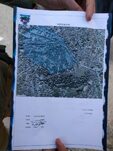17 feb 2019
|
|
On the night of February 16, ISM activists joined a number of local Protection Unit activists to go on a night patrol of the old city in Al Khalil. During the night patrol we were brought into the home of of a family who have recently experienced intimidation and harassment from settlers and the military.
Our hosts described to us how settlers, including prominent Hebron settlement spokesperson Noam Arnon invaded the family home by climbing down the stairs from their rooftop, accompanied by the Israeli army. Our host described how, in the presence of the army, Noam Arnon threatened that he would murder the entire family who lived in the house if they did not submit to the demands of the settlers and give up their home. This disgusting threat was allegedly made by the man who is often |
portrayed as a man of peace, and a reasonable voice in the settler community. Our host went on to describe how Anat Cohen, another prominent settler in Al Khalil, was watching this interaction from a nearby home, encouraging the soldiers and settlers to kill the homeowners.
Nighttime invasions of homes by the military are common throughout occupied Palestine. However, instances like this shine a light on the inner workings of the occupation. The event described above is the occupation in a microcosm: one of the world’s most technologically advanced armies, acting on behalf of a group of extremists with an agenda of ethnic cleansing. There is no justice in an occupation.
Nighttime invasions of homes by the military are common throughout occupied Palestine. However, instances like this shine a light on the inner workings of the occupation. The event described above is the occupation in a microcosm: one of the world’s most technologically advanced armies, acting on behalf of a group of extremists with an agenda of ethnic cleansing. There is no justice in an occupation.
|
|
At the end of January the occupation barred international ‘observer’ groups from Al-Khalil (Hebron), who were stationed throughout the city for more than 20 years, following the massacre of 29 Palestinians inside Ibrahim mosque in 1994 by a fanatical Israeli terrorist. Illegal settlers, many of whom proudly celebrate this massacre, are becoming increasingly empowered; effectively given free reign to attack and intimidate Palestinians, facilitated by the occupation soldiers who protect them as they run riot throughout the city.
Last week, hundreds of settlers were bused in from their fortified colonies, roaming the streets laying siege to Palestinian houses, bombarding them with bottles and stones. Families were gravely threatened that if they don’t vacate their homes, they would meet the same fate as the Dawabshas’ who were horrifically murdered by settlers in their home near Nablus. In 2015, Israeli settlers infiltrated the village of Douma, under cover of darkness, to firebomb the Dawabshas’ home, where the family of four were asleep in their beds. The father Saad, mother Reham, and 18-month-old Ali were burned alive, while 4-year old Ahmad suffered from 3rd degree burns over most of his body. In this ‘organized demonstration’, a mob of settlers marched along Shuhada Street, chanting racist anti-arab slogans, before descending upon Palestinians homes and climbing onto rooftops. Terrifying shrieks for help could be heard as the settlers attempted to force themselves through the front and back entrances of houses, with families stacking furniture behind the doors to barricade themselves inside. At the same time, dozens of occupation soldiers, dressed as though they were entering a war zone, surrounded local and international activists who were attempting to reach the families – detaining them under orders to prevent them from leaving. |
Eventually, in the distance we could see the frenzied mob ushered back into buses and chauffeured by police escort, only for the sake of the military who feared the repercussions should any settlers get hurt.
Palestinians in Al-Khalil are deeply concerned that the expulsion of international observer groups, authorized to operate for the past 20 years, will further galvanize settlers, who make no secrets about their intention to expel Palestinians through violence and intimidation, in order to occupy the entire city.
In spite of this however, the communities in Khalil are mobilizing to prepare for the new conditions on the ground. Today, in the primary-school on Shuhada Street, Rana* the principal organized a meeting, gathering more than forty mothers among local and international activists, to discuss strategies to protect the community from future attacks. Particularly the morning and afternoon ‘school runs’, where settlers swoop on Palestinians traveling and returning from school and work; regularly harassing and hurling abuse, driving up and down the road, accelerating through puddles when children walk past. Sometimes they accelerate directly towards the children. Residents have already begun an accompaniment system, while others including the Hebron Defense Committee are positioning themselves on rooftops daily to scout and record.
The illegal settlers and their heinous tactics of intimidation are a vulgar extension of the occupations intent to colonize the entire city. Talking with the principal from a school down the road, he spoke of his kindergarten students who are subject to bag and body searches as they pass through checkpoints each day. Teachers who stand waiting more than an hour as collective punishment for a few stones thrown on the roof of the armored mini-fort the night before. Hundreds of tear-gas canisters collected in and around the schoolyard from illegal invasions made by the occupation soldiers, as they kidnap children accused of throwing stones. Concussion grenades thundering before the first bell. Tear-gas wafting through the classroom before lunch..
Since the 67’ occupation, the Israeli settler movement has concentrated on the colonization of Al-Khalil, with the construction of five illegal settlements penetrating into the heart of the Palestinian city. A policy of indiscriminate restrictions on Palestinians has developed as a means to perpetuate indigenous displacement and the expansion of these illegal colonies. In the early 2000s, the occupying military imposed curfews on the Palestinian community, with entire streets shut off from access. Over 520 Palestinian shops in the center of Khalil were forcibly closed, and another 1000 closed due to the economic impact of Israeli’s checkpoints, road closures, and settler violence. Khalil is described as a microcosm of the colonization of Palestine, with apartheid and occupation in its most acute and vulgar form.
Although, despite its perceived entrenchment, a fierce rejection of normalization exists throughout all fragments of society. Organizers tirelessly mobilize protests and actions, non-violent resistance committees are established regularly, shebab in symbolic defiance rain stones on the rooftops of checkpoints, and the Palestinians as they say, remain in Al-Khalil like the roots of their thousand year old olive trees.
Palestinians in Al-Khalil are deeply concerned that the expulsion of international observer groups, authorized to operate for the past 20 years, will further galvanize settlers, who make no secrets about their intention to expel Palestinians through violence and intimidation, in order to occupy the entire city.
In spite of this however, the communities in Khalil are mobilizing to prepare for the new conditions on the ground. Today, in the primary-school on Shuhada Street, Rana* the principal organized a meeting, gathering more than forty mothers among local and international activists, to discuss strategies to protect the community from future attacks. Particularly the morning and afternoon ‘school runs’, where settlers swoop on Palestinians traveling and returning from school and work; regularly harassing and hurling abuse, driving up and down the road, accelerating through puddles when children walk past. Sometimes they accelerate directly towards the children. Residents have already begun an accompaniment system, while others including the Hebron Defense Committee are positioning themselves on rooftops daily to scout and record.
The illegal settlers and their heinous tactics of intimidation are a vulgar extension of the occupations intent to colonize the entire city. Talking with the principal from a school down the road, he spoke of his kindergarten students who are subject to bag and body searches as they pass through checkpoints each day. Teachers who stand waiting more than an hour as collective punishment for a few stones thrown on the roof of the armored mini-fort the night before. Hundreds of tear-gas canisters collected in and around the schoolyard from illegal invasions made by the occupation soldiers, as they kidnap children accused of throwing stones. Concussion grenades thundering before the first bell. Tear-gas wafting through the classroom before lunch..
Since the 67’ occupation, the Israeli settler movement has concentrated on the colonization of Al-Khalil, with the construction of five illegal settlements penetrating into the heart of the Palestinian city. A policy of indiscriminate restrictions on Palestinians has developed as a means to perpetuate indigenous displacement and the expansion of these illegal colonies. In the early 2000s, the occupying military imposed curfews on the Palestinian community, with entire streets shut off from access. Over 520 Palestinian shops in the center of Khalil were forcibly closed, and another 1000 closed due to the economic impact of Israeli’s checkpoints, road closures, and settler violence. Khalil is described as a microcosm of the colonization of Palestine, with apartheid and occupation in its most acute and vulgar form.
Although, despite its perceived entrenchment, a fierce rejection of normalization exists throughout all fragments of society. Organizers tirelessly mobilize protests and actions, non-violent resistance committees are established regularly, shebab in symbolic defiance rain stones on the rooftops of checkpoints, and the Palestinians as they say, remain in Al-Khalil like the roots of their thousand year old olive trees.
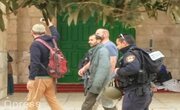
Israeli settlers, on Sunday morning, stormed the courtyards of Al-Aqsa Mosque via the Moroccan Gate, accompanied by occupation police.
According to Al Ray sources in Jerusalem, 60 Israeli settlers stormed the mosque in the company of rabbis, carrying out provocative tours in its courtyards, and receiving explanations about the alleged historic temple.
Israeli settlers storm the Islamic holy site on a daily basis, in the attempt to divide the mosque temporally and spatially, to Judaize the city of Jerusalem.
Archive IMEMC post 06/12/16 Rabbi Lau: 3rd Temple Can be Built Without Destroying Al Aqsa
According to Al Ray sources in Jerusalem, 60 Israeli settlers stormed the mosque in the company of rabbis, carrying out provocative tours in its courtyards, and receiving explanations about the alleged historic temple.
Israeli settlers storm the Islamic holy site on a daily basis, in the attempt to divide the mosque temporally and spatially, to Judaize the city of Jerusalem.
Archive IMEMC post 06/12/16 Rabbi Lau: 3rd Temple Can be Built Without Destroying Al Aqsa
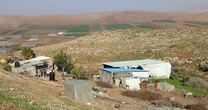
Israeli settlers escorted by full-armed soldiers on Sunday evening attacked Palestinian shepherds in the northern Jordan Valley.
Local activist Mootaz Besharat said a horde of Israeli settlers attacked Palestinian shepherds as they grazed their sheep in al-Farisiya area, in the northern Jordan Valley.
The settlers stole sheep from the area. Israeli soldiers showed up at the scene to provide the settlers with a tight security shield.
Palestinian citizen Ahmed Abu Muhsen was detained for hours before he was summoned to questioning at an Israeli detention center.
Local activist Mootaz Besharat said a horde of Israeli settlers attacked Palestinian shepherds as they grazed their sheep in al-Farisiya area, in the northern Jordan Valley.
The settlers stole sheep from the area. Israeli soldiers showed up at the scene to provide the settlers with a tight security shield.
Palestinian citizen Ahmed Abu Muhsen was detained for hours before he was summoned to questioning at an Israeli detention center.
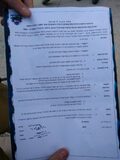
The Israeli occupation forces on Sunday morning prevented activists from securing children’s access to their schools in the southern occupied West Bank province of al-Khalil.
Anti-settlement activists said an Israeli patrol blocked their access to Palestinian schools to prevent them from monitoring daily violations by Israeli soldiers against students.
An Israeli patrol forced them out of al-Shuhadaa Street, declaring the area a closed military zone.
Sometime earlier extremist Israeli settlers stormed the headquarters of the Youth against Settlement Movement and came down heavily on its staff members.
Anat Cohen steals international observer’s notebook
Anat Cohen (ענת כהן), daughter of the convicted Israeli terrorist Moshe Zar, attacked another international who was observing schoolchildren on their commute to the Qurtuba school this morning.
The International was an elderly woman who was keeping tally in a notebook of the number of schoolchildren that passed through the checkpoint and how many were harassed by illegal settlers or the israeli occupation forces. These numbers are submitted to UNSECO and Save the Children.
Cohen suddenly appeared and, before ISM volunteers could start recording video, she punched the woman in the ribs and began scolding her. ISM caught the rest of the exchange on video, when Cohen stole the observer’s notebook:
Anti-settlement activists said an Israeli patrol blocked their access to Palestinian schools to prevent them from monitoring daily violations by Israeli soldiers against students.
An Israeli patrol forced them out of al-Shuhadaa Street, declaring the area a closed military zone.
Sometime earlier extremist Israeli settlers stormed the headquarters of the Youth against Settlement Movement and came down heavily on its staff members.
Anat Cohen steals international observer’s notebook
Anat Cohen (ענת כהן), daughter of the convicted Israeli terrorist Moshe Zar, attacked another international who was observing schoolchildren on their commute to the Qurtuba school this morning.
The International was an elderly woman who was keeping tally in a notebook of the number of schoolchildren that passed through the checkpoint and how many were harassed by illegal settlers or the israeli occupation forces. These numbers are submitted to UNSECO and Save the Children.
Cohen suddenly appeared and, before ISM volunteers could start recording video, she punched the woman in the ribs and began scolding her. ISM caught the rest of the exchange on video, when Cohen stole the observer’s notebook:
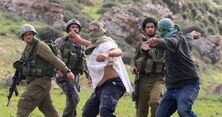
A group of Israeli settlers on Sunday detained and assaulted a Palestinian citizen in Silat ad-Dhahr town in Jenin.
Eyewitnesses said that masked Israeli settlers, with batons in their hands, attacked Palestinian vegetable vendors in the area and severely beat one of them.
Anti-settlement activist Ghassan Daghlas said that the Israeli settlers, by this attack, have crossed all red lines.
Eyewitnesses said that masked Israeli settlers, with batons in their hands, attacked Palestinian vegetable vendors in the area and severely beat one of them.
Anti-settlement activist Ghassan Daghlas said that the Israeli settlers, by this attack, have crossed all red lines.
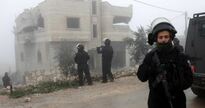
The Israeli occupation forces (IOF) on Sunday stormed a Palestinian house whose residents threatened with eviction in the Old City of Jerusalem as a prelude to allowing Jewish settlers to move in. video
According to local sources, Israeli police forces broke into the house of Abu Assab family in Aqabat al-Khalidiya quarter in the Old City while other forces encircled the house and closed the road leading to it.
Hatem Abu Assab, who lives with his family in the house, had already received a notice ordering him to evacuate the house, but he managed through his lawyer to postpone the eviction order until February 28. video
The family of Abu Assab have been living in this house for more than 56 years and made several appeals to the Palestinian residents of Jerusalem and different institutions to help it stand against the Israeli decision to expel it from the house. video
The family came to the Old City of Jerusalem after it was forcibly displaced from al-Baqa'a neighborhood in western Jerusalem in 1948 following the Deir Yassin massacre.
After they were displaced from western Jerusalem, the grandparents of the family lived in a room in Bab al-Amoud neighborhood of the Old City before moving to the current house in 1952, which they shared with the family of Tufaha. Later, the Tufaha family moved to another place.
The Israeli occupation authority uses the absentees’ property law which it enacted to justify its decision to evict the family from the house.
According to local sources, Israeli police forces broke into the house of Abu Assab family in Aqabat al-Khalidiya quarter in the Old City while other forces encircled the house and closed the road leading to it.
Hatem Abu Assab, who lives with his family in the house, had already received a notice ordering him to evacuate the house, but he managed through his lawyer to postpone the eviction order until February 28. video
The family of Abu Assab have been living in this house for more than 56 years and made several appeals to the Palestinian residents of Jerusalem and different institutions to help it stand against the Israeli decision to expel it from the house. video
The family came to the Old City of Jerusalem after it was forcibly displaced from al-Baqa'a neighborhood in western Jerusalem in 1948 following the Deir Yassin massacre.
After they were displaced from western Jerusalem, the grandparents of the family lived in a room in Bab al-Amoud neighborhood of the Old City before moving to the current house in 1952, which they shared with the family of Tufaha. Later, the Tufaha family moved to another place.
The Israeli occupation authority uses the absentees’ property law which it enacted to justify its decision to evict the family from the house.
15 feb 2019
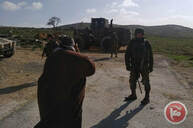
Israeli forces razed and leveled lands in the Urif village, in the northern occupied West Bank district of Nablus, on Friday morning.
Israeli forces also sealed a road with dirt mounds to prevent villagers from reaching their agricultural lands.
Ghassan Daghlas, an official who monitors settlement activity in the northern West Bank, told Ma’an that Israeli forces and settlers are attempting to “impose a reality” on Palestinian lands classified as Area B by razing and leveling large area of lands and preventing farmers from reaching their lands by placing dirt mounds to block the road.
Palestinian farmers own more than 200 dunams of agricultural lands in the eastern area of Urif.
Daghlas pointed out that the razing comes hours after Israeli settlers, from the nearby illegal Israeli settlement of Yitzhar, complained about the opening of an agricultural road for Palestinian farmers in Urif, which caused clashes to erupt between locals and Israeli forces and settlers.
Israeli forces also sealed a road with dirt mounds to prevent villagers from reaching their agricultural lands.
Ghassan Daghlas, an official who monitors settlement activity in the northern West Bank, told Ma’an that Israeli forces and settlers are attempting to “impose a reality” on Palestinian lands classified as Area B by razing and leveling large area of lands and preventing farmers from reaching their lands by placing dirt mounds to block the road.
Palestinian farmers own more than 200 dunams of agricultural lands in the eastern area of Urif.
Daghlas pointed out that the razing comes hours after Israeli settlers, from the nearby illegal Israeli settlement of Yitzhar, complained about the opening of an agricultural road for Palestinian farmers in Urif, which caused clashes to erupt between locals and Israeli forces and settlers.
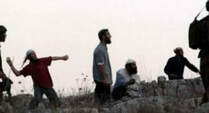
Extremist Israeli settlers attacked, on Thursday, the homes of Palestinians in the village of Asira al-Qiblia, southwest of occupied West Bank city of Nablus, according to a local official.
Ghassan Daghlas, who monitors settlement activities in the area, told WAFA that a number of extremist settlers, protected by a military escort, attacked Palestinian homes with stones, in the outskirts of the village.
This came hours after settlers carried out a similar attack on homes in the nearby village of Urif. There were no reports of injuries in the two attacks.
Settler violence against Palestinians and their property is routine in the West Bank, and is rarely prosecuted by Israeli authorities.
Similar attacks by Jewish settlers, in the past, has resulted in the killing of defenseless Palestinian civilians, as well as the injury of many others.
According to the Israeli rights group B’Tselem, “As the occupying force, Israel must protect the Palestinians in the West Bank. However, the Israeli authorities neglect to fulfill this responsibility and do not do enough to prevent Israeli civilians from attacking Palestinians, their property and their lands.”
Ghassan Daghlas, who monitors settlement activities in the area, told WAFA that a number of extremist settlers, protected by a military escort, attacked Palestinian homes with stones, in the outskirts of the village.
This came hours after settlers carried out a similar attack on homes in the nearby village of Urif. There were no reports of injuries in the two attacks.
Settler violence against Palestinians and their property is routine in the West Bank, and is rarely prosecuted by Israeli authorities.
Similar attacks by Jewish settlers, in the past, has resulted in the killing of defenseless Palestinian civilians, as well as the injury of many others.
According to the Israeli rights group B’Tselem, “As the occupying force, Israel must protect the Palestinians in the West Bank. However, the Israeli authorities neglect to fulfill this responsibility and do not do enough to prevent Israeli civilians from attacking Palestinians, their property and their lands.”
